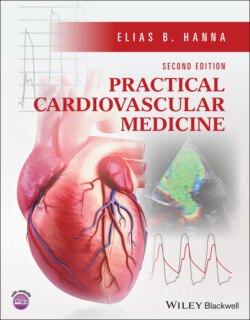Читать книгу Practical Cardiovascular Medicine - Elias B. Hanna - Страница 41
B. Other therapies
Оглавление1 β -Blocker therapy: in the pre-reperfusion era, high doses of β-blockers improved post-MI mortality.115 In the reperfusion era, in the absence of HF or low EF, the long-term benefit of β-blocker therapy beyond 1 year is questionable;116 β-blocker therapy still improves short-term post-MI outcomes and remains indicated for 1–3 years, low-to-medium doses being acceptable and equally beneficial in this setting (e.g., metoprolol 25–50 mg/d).73,116,117 High doses may lead to severe fatigue or bradycardia and may not be tolerated. β-blockers improve long-term mortality in the HF and EF≤40% settings, wherein they are titrated to high doses but slowly (e.g., carvedilol is started as 6.25 mg BID and doubled every 3–10 days) (CAPRICORN trial).118
2 ACE-I: while particularly indicated in hypertension or LV dysfunction, it is also useful for 6 weeks after any MI (ISIS-4 trial). In the stable phase beyond 6 weeks, if EF is normal and SBP is ≤ 130 mmHg, ACE-I therapy does not definitely improve outcomes (PEACE trial, prior MI subgroup).119 In light of the SPRINT trial, the blood pressure goal is ≤ 130 mmHg.120
3 High-intensity statin therapy is administered regardless of LDL. The LDL goal after ACS is < 60–70 mg/dl.121 Other agents can be combined with high-intensity statin if needed (e.g., PCSK9 inhibitors, ezetimibe, bile acid-binding resins, niacin).
4 Aldosterone antagonist is administered for an EF < 40% associated with any degree of clinical HF or diabetes; creatinine must be < 2 mg/dl.122
5 Proton pump inhibitors (PPIs) may inhibit CYP2C19 and thus reduce the conversion of clopidogrel to its active metabolite. PPIs were associated with increased cardiovascular events in some retrospective analyses of clopidogrel therapy. Yet, the only randomized trial that compared PPI to placebo in patients requiring clopidogrel therapy showed a reduction of GI events with omeprazole without any increase in cardiac events.123 Thus, patients who definitely need a PPI, such as patients with an established history of peptic ulcer disease, esophagitis, or GI bleed, or patients receiving a triple antithrombotic combination, are appropriately treated with a PPI. Patients with dyspepsia or reflux symptoms should not receive a PPI.Figure 1.8 Antiplatelet therapy after PCI in patients who also require anticoagulation (AF, LV thrombus) (according to ESC and North American perspective 2021).112 Warfarin replaces NOAC in mechanical valves or mitral stenosis.NSAIDs should be avoided for their known risks of renal failure, fluid retention, HTN, and GI bleed, especially in combination with aspirin and clopidogrel. Acetaminophen, local remedies (e.g., lidocaine cream), or, if needed, a short course of tramadol may be tried for osteoarthritic pain. If an NSAID is absolutely necessary, use the lowest possible dose and administer aspirin 2 hours before the NSAID.
6 Return to regular activities, including sexual activities, 1–2 weeks after NSTEMI. Patients with a large infarct and new LV dysfunction should avoid strenuous activities for 4 weeks (high arrhythmic risk during this period).
